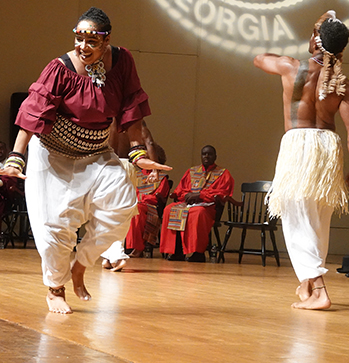- About
- Academics
- Admissions & Aid
- Life
- Research
- News & Events
- Homecoming

Home
> Academics
> Majors minors
> Applied physics (dual degree) | nb2024
Physics
Physics is the force that makes the universe work and Morehouse physics majors tackle these fundamental laws of nature.
About Physics/Applied Physics
We offer a spectrum of courses that reflects both the integral character of physics in the liberal arts curriculum and its essential role in engineering and technology.
-
Overview
Overview
Our mission is to enhance our students’ intellectual skills through the rigorous study of physics. We offer a spectrum of courses that reflects both the integral character of physics in the liberal arts curriculum and its essential role in engineering and technology.
The program’s goals are to:
- Prepare physics majors for graduate study in physics and other professional careers
- Prepare dual-degree engineering program majors for matriculation at engineering schools
- Support the preparation of students majoring in biology, chemistry, computer science, and mathematics
- Assist other majors in satisfying the college’s general education requirements in science
Although the program plays a multipurpose role in the curriculum of the college, its primary objective is to prepare students for graduate study and ultimately successful careers in physics. The program also recognizes and accepts its responsibility to address the under-representation of African Americans in science and engineering. Historically, this has been and remains a foremost responsibility in our program. In this light, the program fosters in its students the ideals of ethical behavior and civic engagement, which are necessary for them to become leaders in the realm of science and engineering.
-
Concentration
Concentration
The Physics major offers six specializations to students, including:
- Astronomy
- Computational Physics
- Interdisciplinary Science (Applied Physics)
- Interdisciplinary Science (Biomedical Physics)
- Physics Education
- Application to Society (Law and Politics)
-
Outcomes
Outcomes
Physics majors should identify and understand the fundamental principles of classical and modern physics, and acquire the analytical and conceptual skills needed to apply these principles to the solution of problems of practical interest.
Students should develop an awareness of the implications of the role that scientific and technological advances play in contemporary society.
Overview
Our mission is to enhance our students’ intellectual skills through the rigorous study of physics. We offer a spectrum of courses that reflects both the integral character of physics in the liberal arts curriculum and its essential role in engineering and technology.
The program’s goals are to:
- Prepare physics majors for graduate study in physics and other professional careers
- Prepare dual-degree engineering program majors for matriculation at engineering schools
- Support the preparation of students majoring in biology, chemistry, computer science, and mathematics
- Assist other majors in satisfying the college’s general education requirements in science
Although the program plays a multipurpose role in the curriculum of the college, its primary objective is to prepare students for graduate study and ultimately successful careers in physics. The program also recognizes and accepts its responsibility to address the under-representation of African Americans in science and engineering. Historically, this has been and remains a foremost responsibility in our program. In this light, the program fosters in its students the ideals of ethical behavior and civic engagement, which are necessary for them to become leaders in the realm of science and engineering.
Concentration
The Physics major offers six specializations to students, including:
- Astronomy
- Computational Physics
- Interdisciplinary Science (Applied Physics)
- Interdisciplinary Science (Biomedical Physics)
- Physics Education
- Application to Society (Law and Politics)
Outcomes
Physics majors should identify and understand the fundamental principles of classical and modern physics, and acquire the analytical and conceptual skills needed to apply these principles to the solution of problems of practical interest.
Students should develop an awareness of the implications of the role that scientific and technological advances play in contemporary society.